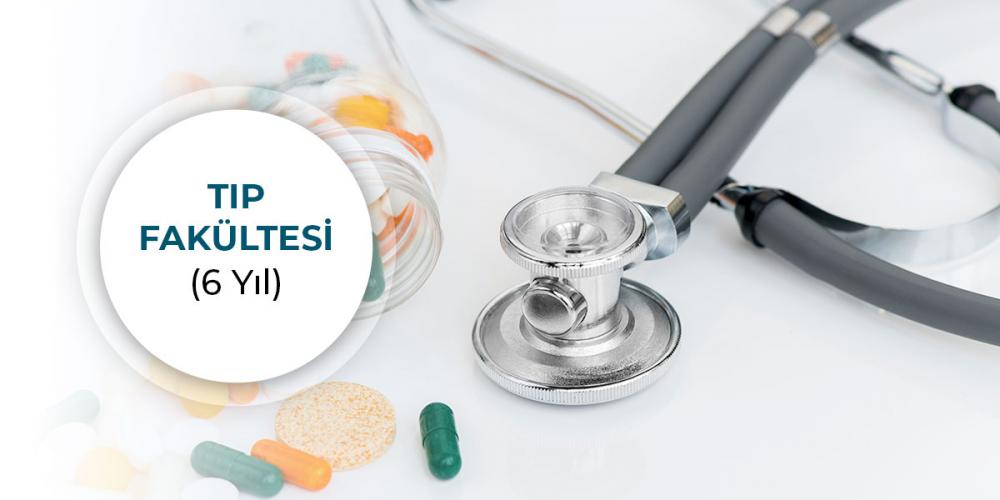
Program Profili
Fakültemizde entegre-hibrid sistem temelli probleme dayalı öğrenme ile destekli interaktif eğitim etkinlikleriyle zenginleştirilmiş eğitim programı uygulanmaktadır. Öğrencilerimizin eğitim sorumluluklarını üstlenmeleri ve öğrenme gereksinimlerini fark etmeleri amaçlanmış, onların mesleki ve bireysel gelişimi esas alınmıştır.
Fakültemizin temel amacı yeterli bilgi, beceri ve davranışa sahip etik değerlere saygılı, araştırmacı, sorgulayıcı, özgüveni tam, iyi iletişim kurabilen, toplum tarafından saygı duyulan ve örnek olan, mesleğinde başarılı, ileri görüşlü ve bilimsel araştırmalara odaklı, kaliteli sağlık hizmeti verebilecek yetkinlikte hekimler yetiştirmektir.
Entegre sistem, Dönem I, II ve III’te ders konuları arasında bağlantı sağlamak amacıyla, farklı anabilim/bilim dalları tarafından organ sistemleri temelinde farklı saatlerde aynı ders kurulu içinde, benzer konuların koordineli bir şekilde işlenmesiyle yürütülmektedir. Bu entegre sistem içerisinde, aynı zamanda hekimliğe uyum programları kapsamında “Probleme Dayalı Öğrenim” de uygulanmaktadır.
Öğrencilerimize eğitimlerinin birinci döneminde; temel hücre ve doku bilgisi, fizyoloji, biyokimya, iskelet, kas ve eklem anatomisi, mikroorganizmaların genel özellikleri, canlılığın fiziksel kanunlarla ve yasalarla açıklanması, toplum sağlığı sorunları ve temel kavramları ile genetiğin temelleri dersleri verilmektedir.
İkinci dönemde, organizmada organların embriyonik gelişimlerini, anatomik ve histolojik yapılarını ve işlevlerini tanımlama, organizmanın fizyolojisini, sistemlerin işlevlerinin biyofiziksel anlamlarını kavrama, gerçekleşen önemli metabolik olaylar ve enerji kazanımı, metabolik hastalıkların laboratuvar tanısı bilgileri verilmektedir. Ayrıca hastalıkların etyopatogenezi, morfolojik ve klinik ilişkisi, hücre zedelenmesi, adaptasyon ve iltihabın patolojisi, bağışıklık sisteminin çalışması ve fonksiyonlarının kavranması amaçlanmaktadır. İlaçların absorbsiyonu, dağılımı, metabolizması, temel etki mekanizmaları, ilaçlara direnç ve ilaç etkileşimleri olmak üzere ilaçlar hakkında temel bilgi de verilmektedir.
Üçüncü dönemde hastalıklarla ilgili etyopatogenezi, farmakoloji, mikrobiyoloji, klinik radyolojik ve laboratuvar bulguları ile tanı ve tedavi yöntemleri; halk sağlığı uygulamaları ve yaklaşımı ile ilgili güncel bilgileri kazandırma, hekimlik mesleğinin gerektirdiği temel bilgi, beceri ve tutumları edindirme amaçlanmaktadır.
Dönem I,II ve III’te kurul dersleri için akademik yıl içinde kurul sınavları, akademik dönem sonunda yılsonu ve bütünleme sınavları yapılmakta; tıp dışı zorunlu derslerde ve seçmeli derslerde ise bir ara sınav, dönem sonunda yılsonu ve bütünleme sınavları yapılmaktadır. Dönem IV ve V klinik stajlara ayrılmıştır. Öğrenciler bu dönemlerde farklı kliniklerde eğitim almaktadırlar. Bu eğitim dönemleri teorik ve pratik uygulamalar ile desteklenmektedir.
Altıncı dönem ise mezuniyet öncesi “intörnlük” dönemidir. Bu dönemde öğrenciler, öğretim üyeleri ve uzmanların denetiminde farklı sorumluluklar alarak kendilerini hekimliğe hazırlamaktadır.
Kariyer Fırsatları
Üniversitedeki 6 yıllık eğitimden sonra pratisyen hekim olacak ve ilaç reçetesi yazma iznini alabileceksiniz. Bir tıp alanında uzmanlık elde etmek istiyorsanız TUS’a girip devamında da uzmanlık eğitimi alarak Uzman Doktor olabilirsiniz. Böylece, kamu ve özel hastanelerde çalışabileceğiniz gibi kendi kliniğinizde de çalışabilirsiniz.
Ders Listesi
Tıp Fakültesi ders listesine ulaşmak için lütfen tıklayınız.

